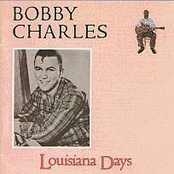Louisiana Days

Biography
Robert Charles Guidry (February 21, 1938 – January 14, 2010), known as Bobby Charles, was an American rhythm & blues singer and songwriter. An ethnic Cajun, Charles was born in Abbeville, Louisiana, and grew up listening to Cajun music and the country and western music of Hank Williams. At the age of 15, he heard a performance by Fats Domino, an event that "changed my life forever," he recalled. Charles helped to pioneer the south Louisiana musical genre known as swamp pop. His compositions in...
Robert Charles Guidry (February 21, 1938 – January 14, 2010), known as Bobby Charles, was an American rhythm & blues singer and songwriter.
An ethnic Cajun, Charles was born in Abbeville, Louisiana, and grew up listening to Cajun music and the country and western music of Hank Williams. At the age of 15, he heard a performance by Fats Domino, an event that "changed my life forever," he recalled.
Charles helped to pioneer the south Louisiana musical genre known as swamp pop. His compositions include the hits See You Later, Alligator, which he initially recorded himself as Later Alligator, but which is best known from the cover version by Bill Haley & His Comets, and Walking to New Orleans, written for Fats Domino.
(I Don't Know Why) But I Do was an early 1960s song that Charles composed, which Clarence "Frogman" Henry had a major hit with, and which was on the soundtrack of the 1994 film Forrest Gump. His composition "Why Are People Like That?" was on the soundtrack of the 1998 film Home Fries.
Because of his south Louisiana–influenced rhythm and blues vocal style, Charles has sometimes been thought to be black, when in fact he was white.
Charles was invited to play with the Band at their November 26, 1976, farewell concert, The Last Waltz, at the Winterland Ballroom in San Francisco. In the concert, Charles played "Down South in New Orleans", with the help of Dr. John and the Band. That song was recorded and released as part of the triple-LP The Last Waltz box set. The performance was also captured on film by director Martin Scorsese, but did not appear in the final, released theatrical version. Charles did, however, appear briefly in a segment of the released film—in the concert's final song, I Shall Be Released. In that segment, his image is largely blocked from view during the performance. That song, sung by Bob Dylan and pianist Richard Manuel, featured backup vocals from the entire ensemble, including Charles.
He co-wrote the song Small Town Talk with Rick Danko of the Band. Promises, Promises (The Truth Will Set You Free) was co-written with Willie Nelson.
Charles continued to compose and record (he was based out of Woodstock, New York, for a time) and in the 1990s he recorded a duet of Walking to New Orleans with Domino.
In September 2007, the Louisiana Music Hall of Fame honored Charles for his contributions to Louisiana music with an induction.
Charles collapsed in his home near Abbeville and died on January 14, 2010.
----------------
Bobby Charles was actually born Robert Charles Guidry in Abbeville, Louisiana circa 1938. A regional New Orleans Swamp Pop fave, whose best known song was "See Ya Later Alligator". That track became a top 20 hit on Chess records in 1955, after a southern Louisiana record store owner hipped the Chicago based R&B label. Bill Haley may have made the song even more popular and accessible a year later, but Charles was first out the gate. He recorded more early self composed sides for Chess like "Ain't Gonna Do It No More" & "Take It Easy Greasy", "No Use Knockin" featuring hot backing musicians like Lee Allen on sax, Charles Williams on drums and Justin Adams on gtr.
By 1958, Bobby Charles (aka on songwriting credits as R.Guidry) started releasing material on The Imperial label. After a year of nominal success on Imperial the Bobby Charles name began showing up mostly doing other writers material on a variety of mainly one off singles on labels like Farie, Hub City, Jewel and Paula until he simply seems to disappear from the record biz circa 1965.
By 1972, Charles had resurfaced in Woodstock, NY and released three singles from a self titled album on Bearsville in the early 70's, including production and co-writing credits from Rick Danko of The Band. Bobby Charles later appeared with Dr. John at The Band's 1978 farewell concert captured on film in The Last Waltz.
He eventually began putting out albums & later CDs on the homespun indie Rice N Gravy imprint. Other musical collaborators with Charles over the Rice N' Gravy years are notables like Neil Young, Dan Penn, Willie Nelson, Sonny Landreth, Derek Trucks, Wardell Quezergue, Rufus Thibodeaux, Fats Domino and Jon Cleary.
Charles most lasting contributions beyond his early Chess rock n roll rave ups, may have been as a songwriter, contributing what some might call Fats Domino's signature tune "Walkin To New Orleans", as well as Clarence Frogman Henry's biggest chart hit "But I Do". He is basically retired, living in Louisiana near the Gulf of Mexico, but recently shared co-writing credits on six of 13 tracks on the 2008 Dr. John album "City That Care Forgot" and came through with "Homemade Songs", his first release since his 2004 collection of rarities, "Last Train to Memphis". As Bob Dylan said in the liner notes to his 2008 album : 'The boy could sing like a bird. He still does, as a matter of fact."
Bobby Charles passed away January 14, 2010, at age 71, after collapsing at his home in Abbeville, Louisiana. He was due to release a new album, "Timeless," featuring new material. He saw the final design for the album's artwork, but died only weeks before its scheduled Feb. 23 release. Read more on Last.fm. User-contributed text is available under the Creative Commons By-SA License; additional terms may apply.
